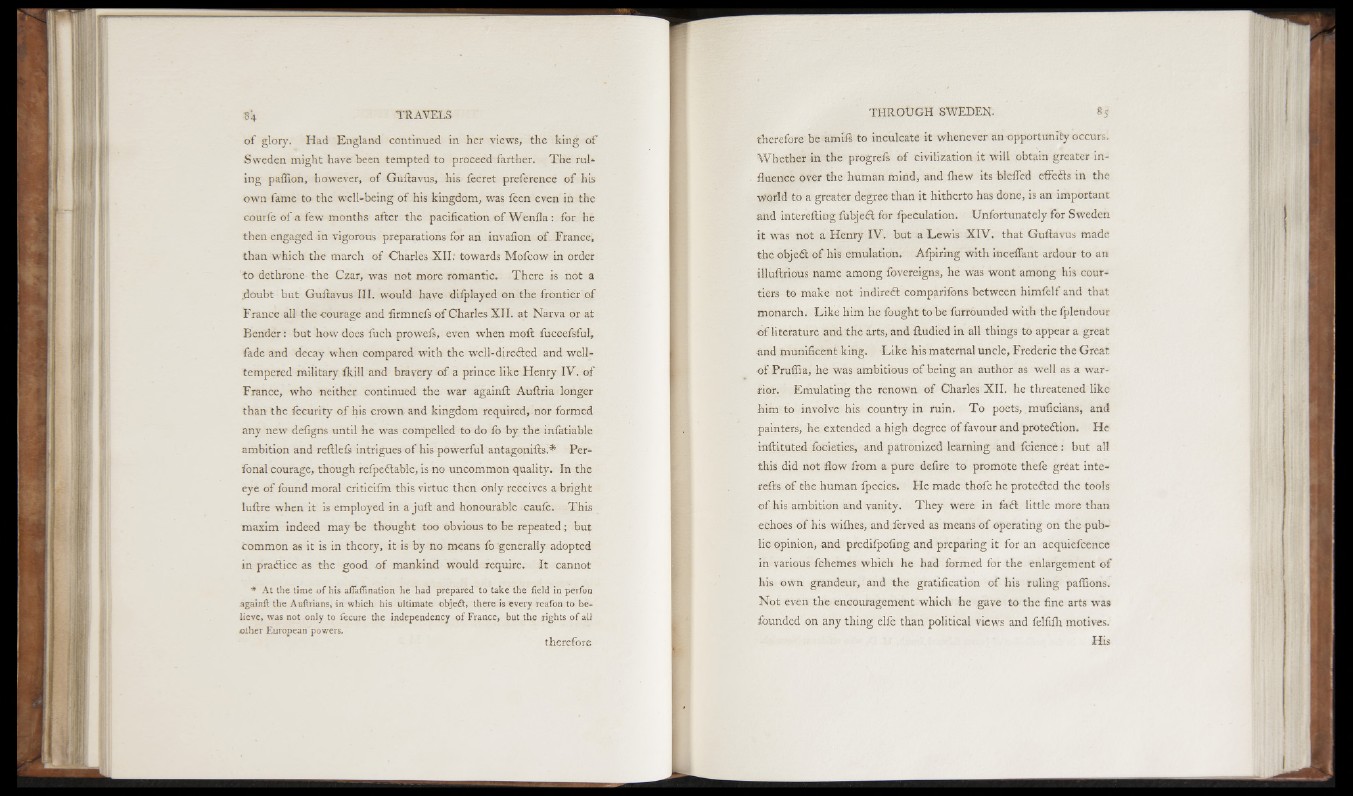
o f glory. Had England continued in her views, the king o f
Sweden might have been tempted to proceed farther. T he rul*
ing paflion, however, o f Guilavus, his fecret preference o f his
own fame to the well-being o f his kingdom, was feen even in the
courfe o f a few months after the pacification o f W en fla : for he
then engaged in vigorous preparations for an invafion o f France,
than which the march o f Charles XII; towards Mofcow in order
'to dethrone the Czar, was not more romantic. There is not a
.doubt but Guitavus III. would have difplaycd on the frontier of
France all the courage and firmnefs o f Charles XII. at Narva or at
Bender: but how does luch proweis, even when moft fuccefsful,
fade and decay when compared with the well-directed and well-
tempered military ikill and bravery o f a prince like Henry IV. o f
France, who neither continued the war againfl: Auftria longer
than the fecurity o f his crown, and kingdom required, nor formed
any new defigns until he was compelled to do fo by the iniatiable
ambition and reftlels intrigues o f his powerful antagonifts.* Per-
fonal courage, though refpeftable, is no uncommon quality. In the
eye o f found moral criticifm this virtue then only receives a bright
luff re when it is employed in a ju ft and honourable caufe. This
maxim indeed may be thought too obvious to be repeated; but
common as it is in theory, it is by no means fo generally adopted
in praflice as the good o f mankind would require. It cannot
■* At the time o f his afiaifination he had prepared to take the field in perfon
againft the Auftrians, in which his ultimate objeft, there is every reafon to believe,
was not only to fecure the independency of France, but the rights of all
other European powers.
therefore
therefore be amifs to inculcate it whenever an opportunity occurs.
Whether in the progrefs o f civilization it will obtain greater influence
over the human mind, and ihew its blefied effefts in the
World to a greater degree than it hitherto has done, is an important
and interefting fubjeft for fpeculation. Unfortunately for Sweden
it was not a Henry IV . but a Lewis X IV . that Guftavus made
the objeft o f his emulation. Afpiring with inceflant ardour to an
illuftrious name among fovereigns, he was wont among his courtiers
to make not indireft comparifons between himfelf and that
monarch. L ik e him he fought to be furrounded with the fplendour
o f literature and the arts, and ftudied in all things to appear a great
and munificent king. L ik e his maternal uncle, Frederic the Great
o f Pruffia, he was ambitious o f being an author as well as a warrior.
Emulating the renown o f Charles XII. he threatened like
him to involve his country in ruin. T o poets, muficians, and
painters, he extended a high degree o f favour and proteftion. He
inftituted focieties, and patronized learning and fcience: but all
this did not flow from a pure defire to promote thefe great inte-
refts o f the human ipecies. He made thofe he protefled the tools
o f his ambition and vanity. They were in faft little more than
echoes o f his wiihes, and.ferved as means o f operating on the public
opinion, and predifpofing and preparing it for an acquiefcence
in various fchemes which he had formed for the enlargement o f
his own grandeur, and the gratification o f his ruling paffions.
N o t even the encouragement which he gave to the fine arts was
founded on any thing elfe than political views and felfiih motives.
His